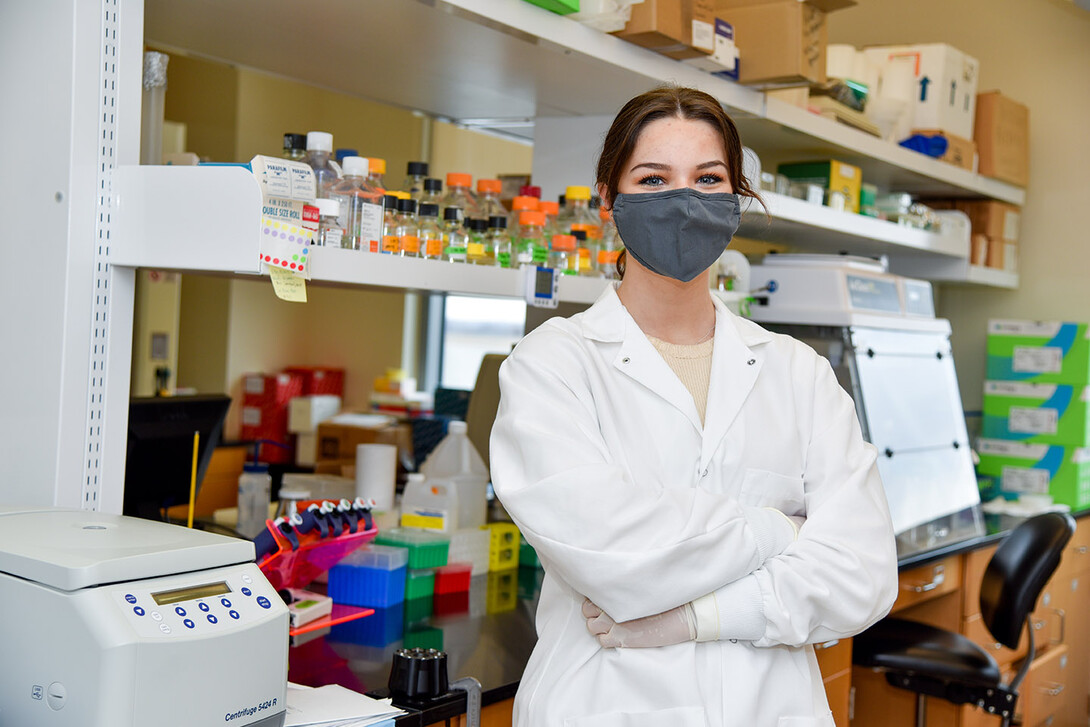
As a junior Clifton Builders Management major with a pre-med focus, Ashley Clegg co-created her experience at the University of Nebraska–Lincoln to prepare for her future in medicine.
The global pandemic recently brought about an opportunity for Clegg to advance science and co-author an article in a respected peer-reviewed journal.
As the COVID-19 death toll continues to rise, Clegg worked alongside a team at the Nebraska Center for Virology to explore how mortality in sub-Saharan Africa appeared to remain relatively low compared to the rest of the world.
“People expected Africa to get hit hard with this virus, but relative to the rest of the world, their mortality rate wasn’t as high,” said Clegg, who is also working on minors in biological sciences, chemistry and mathematics. “The severity of cases and COVID-19 experience in Africa was not as bad as what people expected, so we tried to figure out why that was the case.”
The research examined how prior exposure to numerous seasonal coronaviruses might have created a certain degree of protection to people in sub-Saharan Africa, which others around the world may not have experienced.
“Coronaviruses aren’t new. They’ve been around a long time because it is a common cold virus. COVID-19 seems to be more pathogenic than other coronaviruses,” said Charles Wood, former director of the Nebraska Center for Virology and co-author of the study. “We work with Africa, and even if we can’t be there physically, we have collaborators on the ground. They know they haven’t seen the cases we have in the U.S., and we think they may have some pre-protection prior to the pandemic from being exposed to so many other diseases.”
Through a collaboration with research partners in the region, the Nebraska research team examined pre-COVID-19 pandemic plasma samples from the African region and the United States.
“We have a lot of patient samples we’ve collected over the years from our experience working in Africa with HIV and AIDS,” Wood said. “We took those samples and tested for the presence of antibodies and if they have an immune response to recognize this new coronavirus.”
Clegg’s main role involved screening the plasma samples to determine the reaction of antibodies to exposures of COVID-19 using a process called immunofluorescence assay. The process involves highlighting antibodies in plasma using a fluorescent agent and examining them under a microscope for cross-reactivity, having an immune response, with an introduced virus.
“The thing with IFA is this fluorescence concept,” Clegg said. “A normal negative sample is highlighted red, but if the sample indicates reactivity to something, then there will be some cells that light up green.”
The results produced from the study gave tangibility to the hypothesis and revealed an estimated 15-20% of the population in sub-Saharan Africa already had antibodies that cross-react with the COVID-19 virus, while the U.S. samples only showed roughly 3% who had that same immune response.
“Does this mean people in sub-Saharan Africa have some type of protected immune response? Possibly,” Wood said. “These results may explain why they are less affected and if infected, less diseased.”
Wood believes this research will not only continue to elevate the status of Nebraska and its virology research, but also have a larger impact on the world as it continues to move forward in the pandemic.
“Through our work, we have a better understanding of protection against COVID-19, why some people are less susceptible and what’s protecting them,” Wood said. “Learning that can help people all over the world.”
Working on the research project solidified Clegg’s confidence in her career track.
“I’m passionate about this research because I’m interested in everything about furthering science and helping people,” she said. “It’s not developing a vaccine, but it’s answering questions that pave the way for research in the future that you can’t even imagine.”
Combined with her experiences exploring leadership and entrepreneurship as a Clifton Builder and pursuing her certificate in sales excellence, Clegg feels ready to enter medical school.
“The overlap between my career choices in business and medicine is what gets me out of bed in the morning,” Clegg said. “What drives me is the concept of helping people and solving problems. Through my time as a Builder and other experiences in the College of Business, I’m more prepared for my future in medicine.”
The research team at Nebraska included John West, associate professor of biochemistry; For Yue Tso, research assistant professor; Phoebe Peña, junior biological sciences major from Los Angeles, along with Wood and Clegg. Their colleagues in Africa included Salum Lidenge, John Ngowi, Julius Mwaiselage, Owen Ngalamika and Peter Julius.







